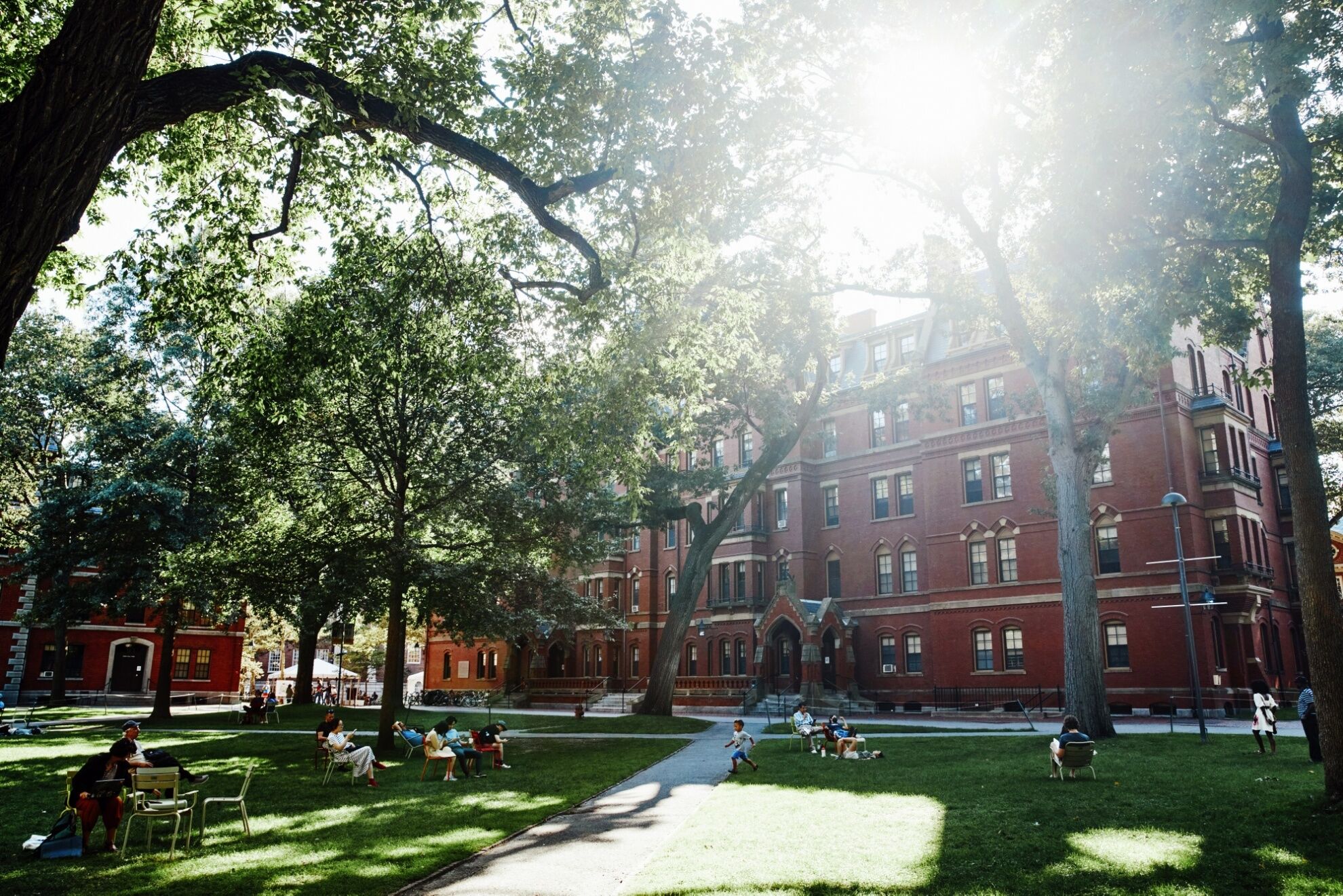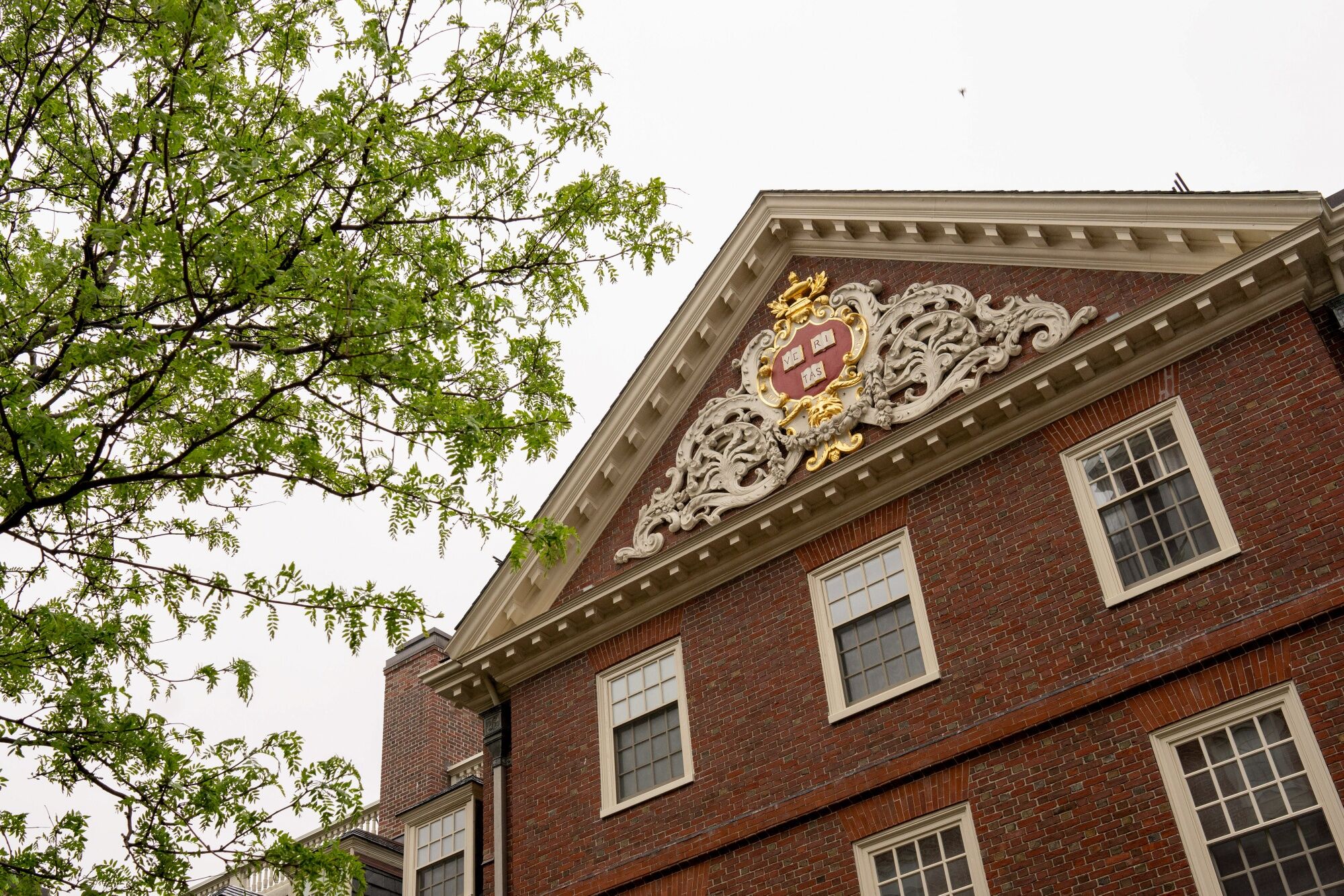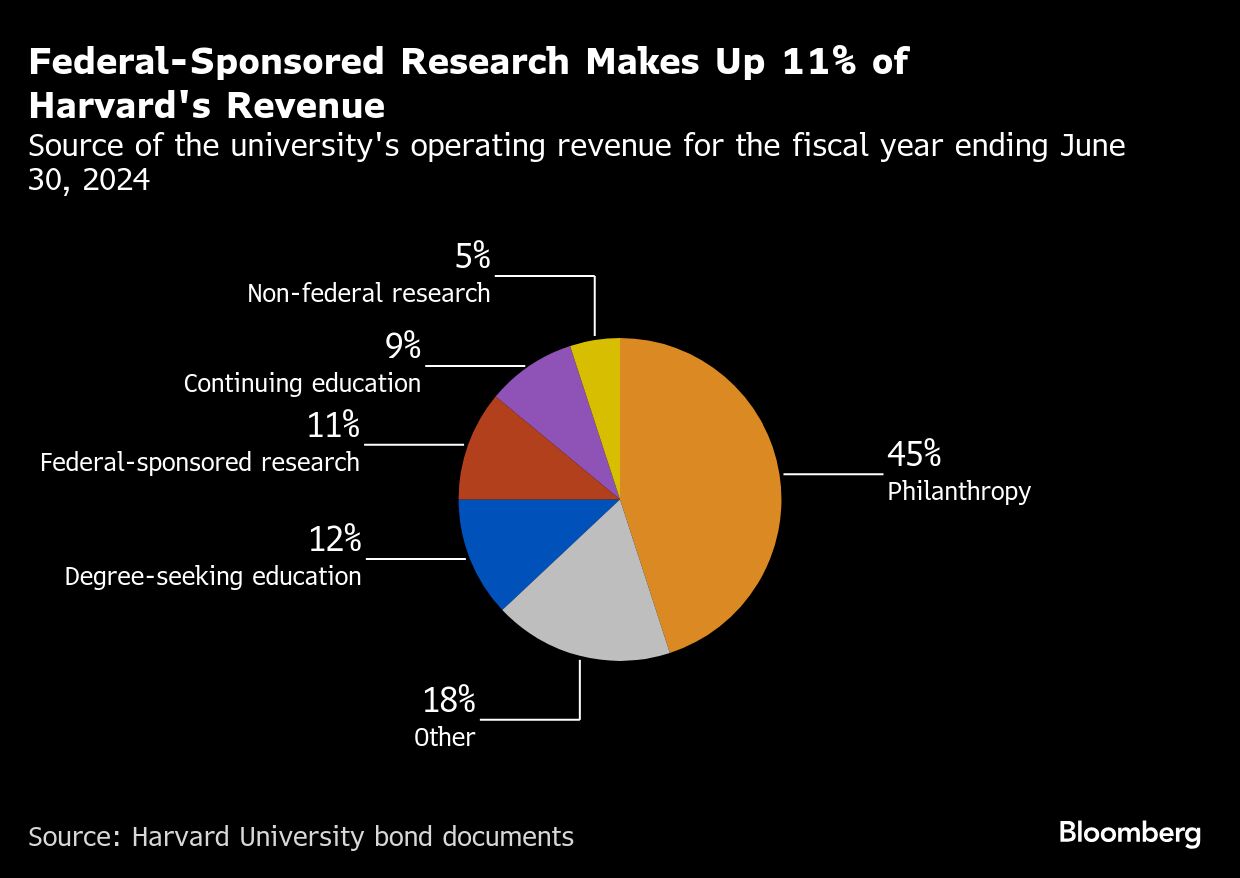How Trump Is Targeting Harvard: The Multiple Fronts of His Assault
(Bloomberg) -- In its campaign to pressure elite US colleges to make a wide range of policy changes, the administration of President Donald Trump has come down hardest on Harvard University.
Framing its actions as an initiative to fight campus antisemitism and enforce civil rights protections, the government has frozen more than $2.6 billion in research funding for the Ivy League school and moved to cancel the last remaining $100 million or so in federal contracts. It has also tried to bar the university from enrolling international students and prevent foreign nationals from entering the US to study at the college — efforts that were both temporarily blocked by a court.
There could be more pain on the way for America’s oldest and richest university. Trump and Treasury Secretary Scott Bessent have said the administration will strip Harvard of its tax-exempt status — a benefit that saved it at least $465 million in 2023, according to Bloomberg News analysis. And legislation that so far has passed the Republican-led House of Representatives includes a significant tax increase on the net investment from private college endowments, including Harvard’s.
What is Trump’s problem with elite universities?
Trump has long railed against elite universities, which he argues foster ideas antithetical to American values and observe policies that violate laws prohibiting racial discrimination. During his 2024 election campaign, Trump threatened to use taxation, fines and lawsuits to shrink “excessively large private endowments” and wrote that he would “reclaim our once great educational institutions from the radical Left and Marxist Maniacs.”
What is Trump’s issue with Harvard?
Trump’s criticism of Harvard has focused mainly on its leadership’s alleged failure to adequately combat antisemitism. The war between Israel and the Palestinian group Hamas, which the US classifies as a terrorist organization, provoked protests at Harvard, among other US colleges. Some Jewish students and outside Jewish groups complain that the turmoil unleashed rampant antisemitism.
In August 2024, Alan Garber was confirmed as the president of Harvard, replacing Claudine Gay, who’d resigned the previous January. Garber made changes in response to the complaints, such as adopting a formal definition of antisemitism and introducing new educational programming for students.
But Trump and other conservatives complained that Harvard didn’t go far enough to protect Jewish students. In an April 11 letter to the university, the Trump administration identified a group of Harvard programs, including the Center for Middle Eastern Studies and the Divinity School, that it said “fuel antisemitic harassment or reflect ideological capture.”
The Department of Homeland Security said in a May 22 statement that Harvard’s leadership had “created an unsafe environment by permitting anti-American, pro-terrorist agitators to harass and physically assault individuals.” It said many of the agitators were international students.
The department also accused Harvard’s leadership of co-ordinating with the Chinese Communist Party. Republican lawmakers in Congress sent a May 19 letter to Garber demanding information about the school’s links to China’s government and its military, and alleging that the university has hosted and trained members of a paramilitary organization carrying out a genocide against the Uyghurs , a Muslim ethnic group.

What does the administration want Harvard to do?
The administration’s April 11 letter laid out a set of governance reforms that it said Harvard must make to still get federal dollars. They included: that Harvard achieve “viewpoint diversity” in its academic departments; adopt strictly “merit-based” admissions and hiring practices; eliminate diversity, equity and inclusion programs; diminish the influence of faculty “more committed to activism than scholarship”; and ban international students “hostile to American values.”
How has Harvard responded?
Garber rejected the demands, saying in a statement on April 14: “No government — regardless of which party is in power — should dictate what private universities can teach, whom they can admit and hire, and which areas of study and inquiry they can pursue.”
Harvard is fighting the administration’s actions against it in court.
It filed a lawsuit alleging that by suspending federal research grants, the government has threatened its independence and violated its right to free speech. It argued that government agencies that terminated grants sought to assert undue control of the school and that the government cannot supplant Harvard’s own decision-making in combating antisemitism.
The suit also contended that the government violated federal regulations for cutting funding. For instance, the administration has invoked Title VI of the Civil Rights Act of 1964, which bars discrimination on the basis of race, color or national origin, to justify its actions against Harvard. But Harvard claimed the act gives it the right to work voluntarily with the government to correct any compliance failures, and the government didn’t afford the university any opportunity to do so before freezing funds.
Harvard filed a separate suit arguing that the order for it to immediately stop enrolling international students violates its due process rights and fails to follow federal regulations. US District Judge Allison Burroughs issued a temporary order blocking the administration from enforcing the ban, finding that otherwise Harvard would sustain “immediate and irreparable injury.”
The university amended that lawsuit to cover a proclamation issued by Trump on June 4 banning its international students from entering the US. Trump said that the restrictions are to safeguard national security but in its filing with the court, Harvard accused the president of pursuing a “government vendetta.” Burroughs granted a temporary restraining order, ruling that the administration can’t enforce Trump’s proclamation.

What’s the impact of the funding freeze?
In a letter to the Harvard community , Garber said the consequences will be “severe and long-lasting.” He said it will affect the university’s research on childhood cancer, multiple sclerosis, Parkinson’s disease and Alzheimer’s disease. According to the lawsuit, the freeze will also impact the education of thousands of graduate students and postdoctoral fellows in science, technology, medicine and public health.
In the last academic year, Harvard received approximately $700 million in research funding from various federal agencies, including the Departments of Health and Human Services, Defense and Energy. As Harvard looks to counter the loss of federal funds, it has said it will free up an extra $250 million of university money to help pay for research during the coming academic year, adding to the approximately $500 million it already spends on research annually. Garber is also voluntarily reducing his salary by 25% for the year starting July 1.

Can Harvard offset the funding freeze with its endowment?
Harvard sits on an endowment valued at more than $53 billion. But unlike a bank account, this pool can’t be tapped at any time. A portion of the endowment is paid out as an annual distribution to support the university’s budget. Much of the rest is set aside for specific purposes or tied up in illiquid assets.
What would be the impact of blocking international students?
At Harvard, nearly 6,800 international students — 27% of the entire student body — come from more than 140 other countries, up from 19.6% in 2006, according to the university’s data. If the government is permitted to enforce the ban, the loss of tuition from international students would put Harvard’s finances under further pressure. Harvard has requested a long-term injunction blocking the administration’s ban.
How could the Trump administration block Harvard from enrolling international students?
To enroll students from abroad, educational institutions in the US are required to retain a certification through the Student and Exchange Visitor Program, which falls under the Department of Homeland Security. The certification is intended to ensure that both students seeking admission to the US and the schools that would host them are legitimate.
Institutions must prove that they have appropriate facilities, finances and qualified personnel. They must agree to report student records, as well as changes in any student’s address or employment. Certification, which must be renewed every two years, enables a school to issue the form that prospective international students need to apply for a visa to enter the US.
Can a US president revoke a university’s tax-exempt status?
On May 2, Trump wrote on his Truth Social platform: “We are going to be taking away Harvard’s Tax Exempt Status. It’s what they deserve!” He made the announcement after weeks of threatening a change to the school’s tax status.
Four Democratic senators have called for an investigation into whether Trump’s targeting of Harvard violates a criminal law barring the president from ordering the Internal Revenue Service to target people and organizations with investigations and audits.
It appears Trump “publicly and repeatedly broke this law when he suggested that Harvard should lose its exempt status for not bending to his will,” they said in a letter to Heather Hill, the Treasury Department’s acting inspector general for tax administration. Under the Internal Revenue Code, no organization can lose its tax-exempt status until the IRS conducts a “careful objective review” of its actions and the entity has had a chance to appeal the agency’s decision, the senators wrote.
Has a university’s tax-exempt status been revoked before?
Yes, after a legal fight that spanned years. Bob Jones University in South Carolina lost its federal tax exemption in 1976 because of its policies banning interracial dating. Following a legal challenge, the decision was ultimately upheld by the Supreme Court in 1983. The university dropped the policy in 2000 and regained its tax benefits in 2017.
What’s the benefit of Harvard’s tax-exempt status?
Under the US tax code , Harvard’s contribution to society — education and research — qualifies it for tax-free status, alongside around 1,700 other colleges in the country that also operate as nonprofits.
Tax exemptions afford universities such as Harvard valuable advantages. Donors to tax-exempt organizations can write off their contributions as tax deductions, and Harvard typically raises more than $1 billion annually in such donations. Harvard also sells bonds that pay interest that’s exempt from federal taxes. The school doesn’t pay traditional property taxes on buildings used for educational purposes, instead making voluntary payments to its host cities, Cambridge and Boston.
How have other colleges and universities reacted to pressure from Trump?
In March and April, the Trump administration also issued freezes on federal funding for other elite universities, including Columbia, Cornell, Northwestern, Princeton, and the University of Pennsylvania, citing noncompliance with demands for policy changes and alleged failures to address antisemitism.
Columbia’s response was starkly different from Harvard’s. On March 21, Columbia announced it would comply with the administration’s demands to start negotiations on restoring $400 million in frozen funding. Among other concessions, the school said it would ban the use of masks during campus protests, hire 36 “special officers” with the power to make arrests, and place its Middle Eastern, South Asian, and African studies department under increased oversight.
On April 22, more than 200 presidents and other leaders of academic institutions signed a joint letter opposing “undue government intrusion in the lives of those who learn, live, and work on our campuses” and “the coercive use of public research funding.”
--With assistance from Amanda Albright, Elizabeth Rembert, Akayla Gardner and Brooke Sutherland.
More stories like this are available on bloomberg.com
©2025 Bloomberg L.P.
Post a Comment